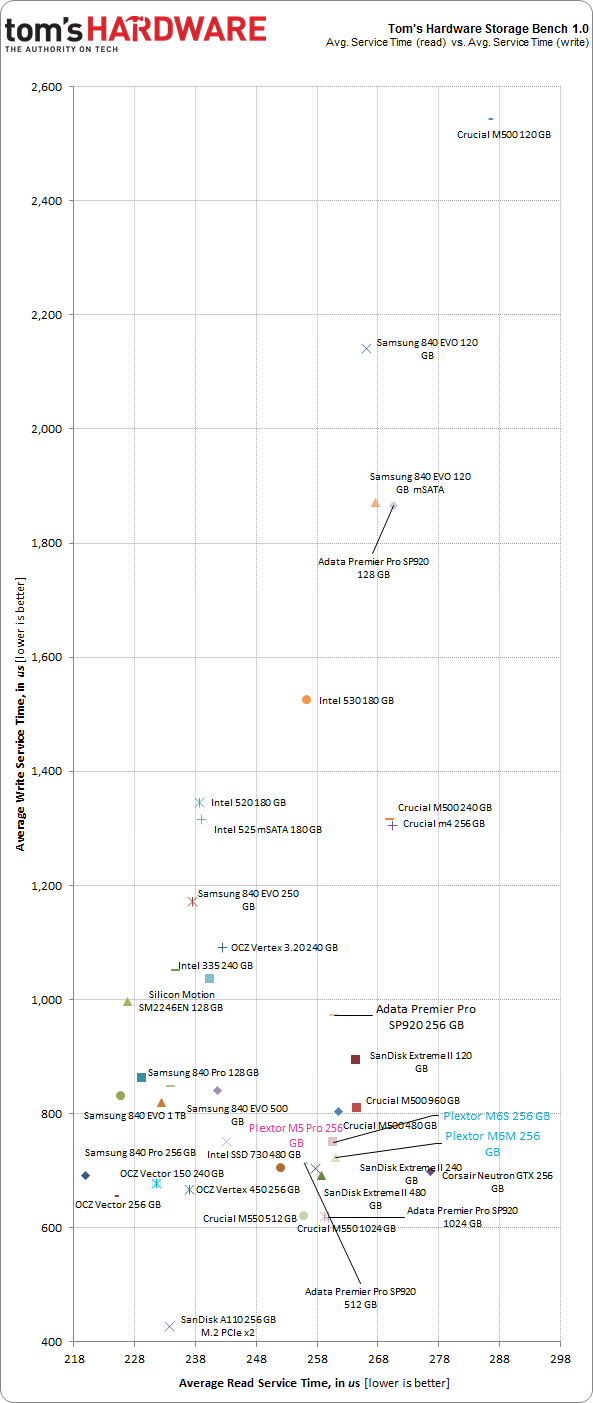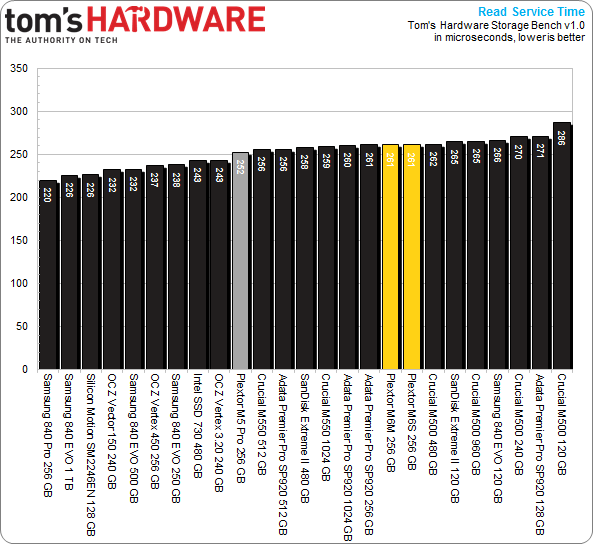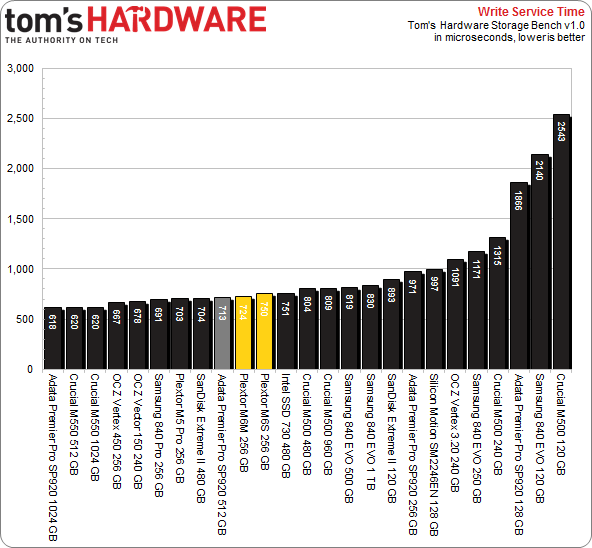Plextor M6S And M6M SSD Review: Revving Another Marvell Engine
Plextor is launching two new SSDs under its M6 banner. The M6S and M6M lean on Toshiba's A19 flash and Marvell's updated 9188 silicon. Together, both components (plus some custom firmware work) should augment value and speed in a couple of form factors.
Results: Tom's Hardware Storage Bench v1.0, Continued
Service Times
Beyond the average data rate reported on the previous page, there's even more information we can collect from Tom's Hardware's Storage Bench. For instance, mean (average) service times show what responsiveness is like on an average I/O during the trace.
It would be difficult to graph the 10+ million I/Os that make up our test, so looking at the average time to service an I/O makes more sense. For a more nuanced idea of what's transpiring during the trace, we plot mean service times for reads against writes. That way, drives with better latency show up closer to the origin; lower numbers are better.
Write latency is simply the total time it takes an input or output operation to be issued by the host operating system, travel to the storage subsystem, commit to the storage device, and have the drive acknowledge the operation. Read latency is similar. The operating system asks the storage device for data stored in a certain location, the SSD reads that information, and then it's sent to the host. Modern computers are fast and SSDs are zippy, but there's still a significant amount of latency involved in a storage transaction.
We get some good news for Plextor's M6 family. Collectively, both of the 256 GB samples we're testing stand up to the older (and well-respected) M5 Pro. Considering the M6es are currently more mainstream-oriented, that's positive indeed.
Although the M5 Pro does fare better in reads, our write measurements are largely comparable. That's no small feat given the dynamics of 64 and 128 Gb dies at the 256 GB capacity point.
Mean Read Service Time
It could be the new flash, Marvell's controller, differences in firmware, or a combination of the three, but both M6-series SSDs finish just behind the M5 Pro. That's more good news, I'd say.
Mean Write Service Time
As I alluded to above, you don't get as much interleaving from 128 Gb dies at the 256 GB capacity point. Despite that reduction in parallelism, the M6es and M5 Pro achieve nearly the same mean write service times. That's fairly remarkable, since the 840 EVO, SP920, and M500 leverage the same number of dies and falls significantly behind Plextor's latest.
Get Tom's Hardware's best news and in-depth reviews, straight to your inbox.
It's possible that Marvell's new controller gets some of the credit, though Plextor might also be more cleverly utilizing its NAND.
Current page: Results: Tom's Hardware Storage Bench v1.0, Continued
Prev Page Results: Tom's Hardware Storage Bench v1.0 Next Page PCMark 8's Storage Consistency Test: New For Tom's Hardware-
bjaminnyc I know there are slight performance differences between models and manufacturers, for the home user the discrepancies matter very little other than lifespan. It all comes down to price point for non-commercial application, not sure where this really fits in the product stack.Reply -
WithoutWeakness The Marvell 88SS9188 controller in the M6S is only capable of addressing 4 NAND channels at a time whereas the 88SS9187 (Crucial M500, Plextor M5Pro) and 88SS9189 (Crucial M550) are capable of addressing a full 8 channels. I would expect the Plextor M6Pro to use the newer 88SS9189 found in the M550 to be able to address 8 channels of NAND and support up to 1TB drives using 128Gbit NAND.Reply -
Ipatinga Clean looks... ok update for the M5S... here hopping M6P will have something on its sleeve performance wise. I liked the Plextor software (its like a bonus for some people... ).Reply
But I still have the Samsung 840 EVO on my list, after all, when the dust settles, they both perform very well in a notebook for a regular joe, but the EVO has the price to beat.
Since my Crucial m4 is not dead... I will wait... mainly for prices to go even lower so I can get a higher capacity model instead of the best of the best. -
cryan Reply13069953 said:The Marvell 88SS9188 controller in the M6S is only capable of addressing 4 NAND channels at a time whereas the 88SS9187 (Crucial M500, Plextor M5Pro) and 88SS9189 (Crucial M550) are capable of addressing a full 8 channels. I would expect the Plextor M6Pro to use the newer 88SS9189 found in the M550 to be able to address 8 channels of NAND and support up to 1TB drives using 128Gbit NAND.
So we weren't able to get confirmation from Plextor or Marvell, but it's probably the case that the 9188 is a cut down four channel version of the 9189. It's all the more annoying, because this is the third review in a row with new Marvell silicon but no actual info from Marvell.
We have a pretty good idea of this from looking at the 9174 4 channel used in the UltraPlus vs the 8 channel 9175 used in.... pretty much everything else ever made... that the 9188 is a four channel version of the 9189. But we don't know how many CEs per channel it has, or much else for that matter.
However, we do know Plextor's M6 Pro will have a 1 TB version, also with A19 flash. Plextor reps told me as much at the 2013 Flash Memory Summit. That was last August though, so I think there have been some delays -- either with Marvell, Toshiba, or both.
Regards,
Christopher Ryan -
cryan Reply13071551 said:Why not compare the Samsung EVO 840?
If you're referring to the 128 KB sequential and 4 KB random performance, I'm trying to keep those clean. I'd much rather throw down on matchups like this in more important metrics. However, with TRIM testing out this go around, the EVO v. M6 angle got downplayed. It's an oversight.
Regards,
Christopher Ryan
-
cryan Reply13073455 said:I really wish write speeds would actually make a jump.
For sequential writes, you can't do much better than 500 MB/s. The fastest M6M/M6S hits 440 MB/s, and so there just isn't much room left to grow unless you switch to PCIe-based storage or add a couple drives in RAID.
Regards,
Christopher Ryan
-
michaelrhaley Great article! I'd like to see a summary comparison of your top ten drives listed in Tom's best SSDs for the money using your new benchmark. Most important is your omission of Samsung 256G Pro which has been your leader for 8 months cited now as "face meltingly fast". Any performance benchmark must include the Samsung leader. Love to see this right away from you!Reply
Sincerely, Michael -
kalmquist Currently, the 128GB M6S is selling for $100 on Newegg, the 256GB M6S is selling for $165. The 512GB M6S is not listed.Reply
Hard to justify buying these over the Samsung 840 EVO ($85 and $154). Actually, for most uses my first thought would be the Crucial M500 ($75 and $120). The M500 doesn't win on either performance or power consumption, but it is good enough that these will not be major issues for the typical user.


